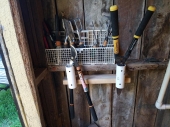Although, I've got to throw this out there.
If you want an easy animal to start out with, you want geese.
Then how about this - a duck flock for eggs with a pair of geese in the mix for protection from predators (and making more geese for the freezer)?
Like so many other people have said, it's pretty subjective. In my yard, the ducks are much better foragers most of the year than the chickens. There's no comparison. They are also easier on my flower beds (except for the hostas) and do less damage if they accidentally get in the garden which almost never happens because they don't fly. My chickens don't either but only because I clip the little devils' wings. On the other hand, chickens can dig up a dormant garden like pros and leave it nearly weed and pest free for spring (and fertilize it in the process). However, if and when I have to pen them up, ducks are disgusting. I swear they can take one cupful of water and use it to turn an entire 10' x 20' run into a stinking, soggy mess. Even their poo is watery which, if they are free-ranging is great because it disappears into the grass but if they are penned, just contributes to the general sogginess. So, if you want them loose and you have a place to put a pond (and what has worked the best for me is a low, 20 gallon trough that we empty and move to a different spot around the orchard every few days), ducks are great. If you want to coop them up, maybe chickens are better, but either one has plusses and minuses so in the end, go with what appeals to you the most.






